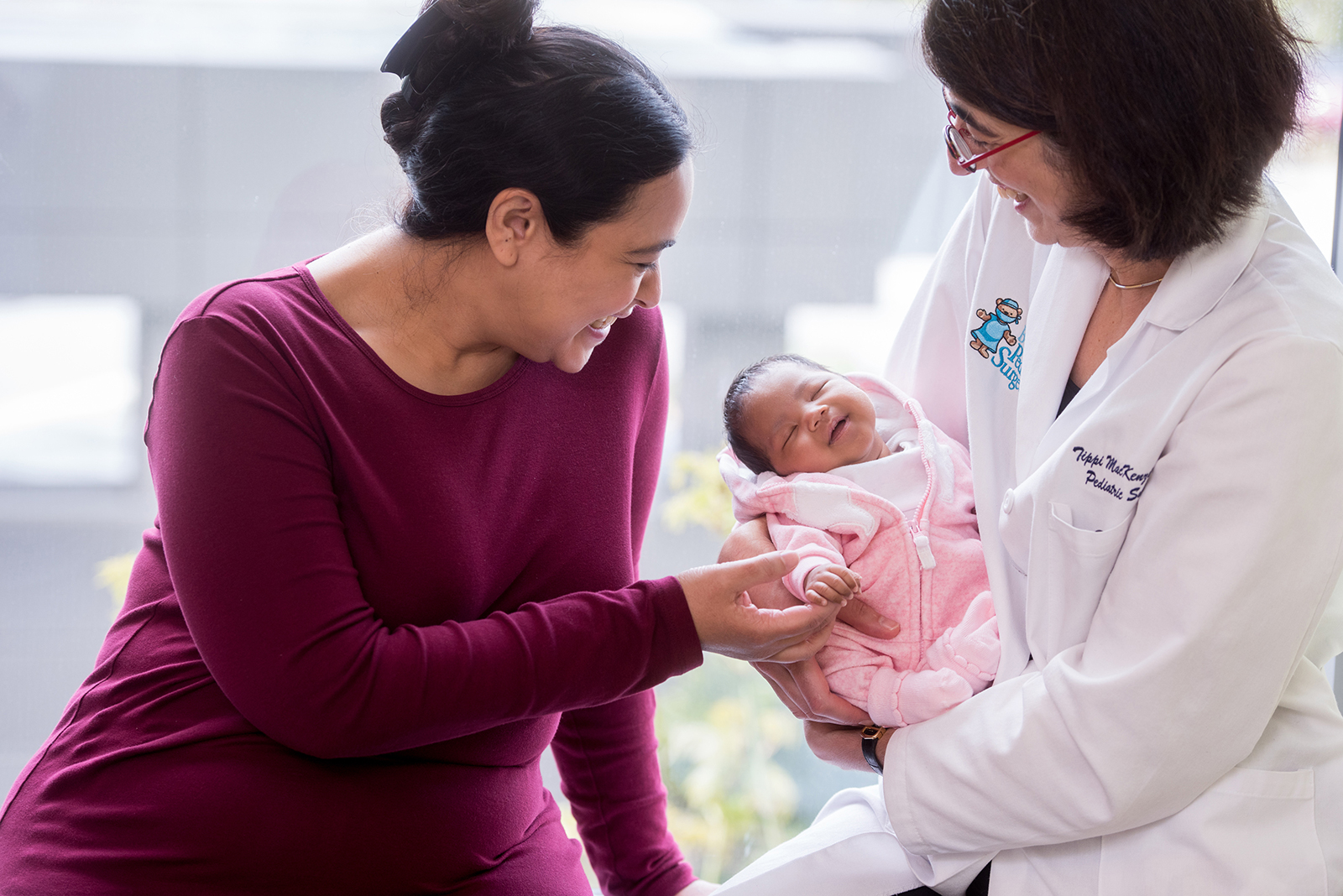Baby Born in World’s First In Utero Stem Cell Transplant Trial
UCSF News reports on the first patient enrolled in the world’s first clinical trial using blood stem cells transplanted prior to birth. The stem cell transplant was used to treat alpha thalassemia major, a blood disorder that is only detected in the last few months of pregnancy and has been almost uniformly fatal in the past. The clinical trial is led by Tippi MacKenzie, MD, an associate professor in the UCSF Division of Pediatric Surgery and co-Director of the UCSF Center for Maternal-Fetal Precision Medicine. The study is funded by a $12.1M grant from the California Institute for Regenerative Medicine and brings together the unique expertise of both UCSF Benioff Children’s Hospitals. 
UC San Francisco researchers have safely transplanted a woman’s stem cells into her growing fetus, leading to the live birth of an infant with a normally fatal fetal condition. The infant, who had been critically ill during the second-trimester of pregnancy due to alpha thalassemia, is the first patient enrolled in the world’s first clinical trial using blood stem cells transplanted prior to birth.
The infant was born at UCSF Medical Center at Mission Bay in February, four months after undergoing the transplant to treat the blood disorder, which is caused by a gene carried by nearly 5 percent of the world’s population.While the ultimate goal will be to assess whether the mother’s stem cells integrate, or engraft, in the fetus’ bone marrow and generate healthy blood cells throughout the child’s life, this phase 1 trial aimed to determine first whether the procedure – which includes infusing the mother’s stem cells along with several blood transfusions – would be safe.
“We are encouraged by how well she and her mother have tolerated this complex treatment,” said Tippi MacKenzie, MD, a pediatric and fetal surgeon at UCSF Benioff Children’s Hospital San Francisco, who performed the pioneering transplant after a decade of research. Normally, women whose fetuses are diagnosed with alpha thalassemia are given a grim prognosis and often terminate the pregnancy due to the low likelihood of a successful birth.
“Her birth suggests that fetal therapy, including fetal transfusions, is a viable option to offer to families with this diagnosis,” MacKenzie said.
During the pregnancy, MacKenzie’s team at the UCSF Fetal Treatment Center treated the fetus with regular in utero blood transfusions, after a medical center near the family’s hometown detected life-threatening swelling, or hydrops, during an ultrasound. The swelling, which included an enlarged heart, was the result of the body’s response to severe anemia and lack of oxygen, which is the hallmark of alpha thalassemia major, the most dangerous variant of the disease.
“Intrauterine blood transfusions were needed to treat the hydrops before the stem cell transplant could be performed,” said Juan Gonzalez Velez, MD, PhD, an obstetrician/gynecologist at the UCSF Division of Maternal-Fetal Medicine, who performed the transfusions. “During the last 30 years, this has been the treatment of choice for patients developing severe fetal anemia and we think that fetuses with alpha thalassemia can also benefit from these transfusions.”
The fetus' poor prognosis improved slowly with each transfusion during the pregnancy, Gonzalez Velez said. The stem cell transplant took place during one of those transfusions.
Read full article at UCSF News
Five Blood Transfusions, One Bone Marrow Transplant — All Before Birth (New York Times)
The world's first! Infant receives first-ever blood #stemcell transplant prior to birth for treatment of #thalassemia at @UCSF via CIRM-funded clinical trial led by Dr. Tippi MacKenzie. https://t.co/rihRiBKKni HT @mercnews pic.twitter.com/uY1HqHsi1s
— CIRM (@CIRMnews) May 29, 2018
This pediatric #BMT work @ucsf was lead by Pediatric Surgeon Tippi MacKenzie &. Watch her talk @ExponentialMed on the cutting edge of pediatric & fetal surgery #xMed https://t.co/Sqq1BUQszA
— Daniel Kraft, MD (@daniel_kraft) May 27, 2018
